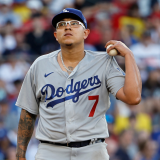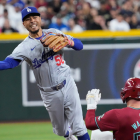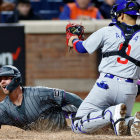In an annoying, if unsurprising development, the Atlanta Braves reassigned outfielder Ronald Acuna on Monday, dashing baseball's top prospect's chance at cracking the big-league roster.
Acuna's demotion has nothing to do with performance and everything to do with business. The 20-year-old hit .432/.519/.727 during the spring with four home runs and stolen bases. Yet the Braves stand to benefit from making their roster worse by farming out Acuna -- that's because two weeks in the minors equals an additional year of team control:
The Braves informed Acuna of the decision after today's game. The heralded prospect will have to remain in the Minors until at least April 13 for the Braves to gain an extra year of contractual control.
— Mark Bowman (@mlbbowman) March 19, 2018
Let's roll through the main talking points: no, the two weeks won't make or break the Braves' season; yes, every other team would've (and will) do the same thing; no, this isn't technically against the rules unless the intent can be proven; yes, the union should be mad; no, the union didn't do a good job protecting against service-time manipulation in the last Collective Bargaining Agreement; and so on. The Acuna demotion still stinks for the sport for the same reasons this winter has -- it reinforces that baseball is a business, and baseball is at its most enjoyable when that fact is obscured.
Throughout the winter, the slow free-agent market was chalked up as evidence teams had wisened up. No longer were general managers willing to throw money at old free agents -- paying for past performance is what the cavepeople did. The problem is that it's hard to reach free agency at a "young" age. You have to be good to hit six years of service time before being done (or mostly done) with your expected prime. Alas, those youngsters most likely to do it -- like Acuna -- have their earning potential suppressed with these unnecessary demotions. It's not, then, that teams don't want to pay old players -- it's that teams don't want to pay any player more than they must.
Call it smart management, but let's be clear: "smart management" really means "saving money." In the Braves' case, "smart management" means entering the season -- their second in a brand-new ballpark -- with a below-average payroll. The Braves have $38 million committed to payroll for the 2019 season, and just $1 million beyond the 2021 season. They don't have to resort to "smart management" to build a competitive team. But they are anyway, because that's baseball in 2018. The game is worse off for it.






















